#hera is my queen
Text
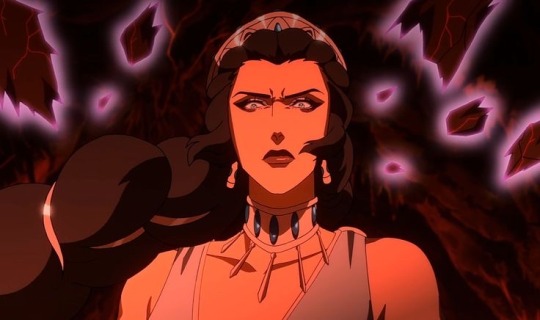
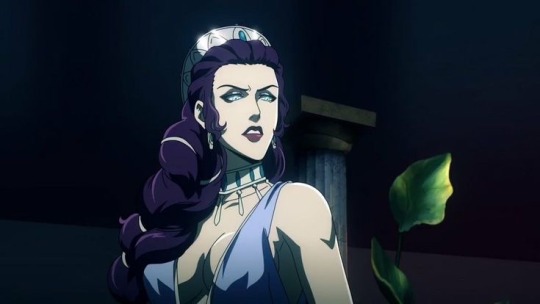
please, on behalf of all the greek deities, I beg for more fanfics with the most perfect and crazy goddess of the greek pantheon, HERA. she is so hot, angry and possessive. despite all her hard layer, we know that there is the sweet hera kind, compassionate, diplomatic and loving. she just needs to be truly loved, for god’s sake. she is the best goddess, despite her crimes committed by anger. I understand her, and I love how creative and cruel she is with her punishments. she has several layers, toxic and healthy. anyway, I love her and would love that she had more stories.
(I love the way she is in the anime “blood of zeus”, I miss your peacocks but I like the aesthetics of the crows. my wife can do anything.
#blood of zeus#blood of olympus#hera#hera goddess#hera x reader#hera greek mythology#hera deity#hera is my queen#angry women#requests#ask#zeus fuck off#she has mommy issues for sure#greek mythology x reader#blood of zeus x reader#blood of zeus season 2#I'm a bitch for hera and I'm not sorry
589 notes
·
View notes
Text


Hera's design digitized. Disco queen of the gods.
#epic the wisdom saga#my art#my artwork#my own#epic the musical#hera#jay rivera herrans#jorge rivera herrans#god games#digital art#art#artists on tumblr#artwork#character art#character design#sexy chick#queen of the gods#disco queen
149 notes
·
View notes
Text
Okay, let's finally talk about EPIC's Apollo
I feel very compelled to say, first of all, that I do not dislike Epic. In fact, I am very fond of Epic and have been following its production and status very eagerly! I attend all the launch streams, I watch all of Herrans' update videos; I am, at the end of the day, a fan and I want it to be known that my words are spoken out of love and passion as much as they are spoken from a place of critique.
So really, what my problem with Epic's Apollo?
In the briefest possible terms; the choice to have Apollo be defined by his musical aspect in God Games is thematically strange. And not in the 'oh well in the Odyssey, Apollo was important to Odysseus and his family so it's weird that that wasn't kept in Epic' strange, strange in the sense that Odysseus' character arc since My Goodbye has been getting more and more obviously Apollonian and so it is positively bizarre that when we get to meet Apollo, the god seems entirely disinterested in him and his affairs. So much so that he is not even defined by any station that would indicate that he has been watching over and protecting Odysseus and his family.
What do I mean by 'Odysseus has been following an Apollonian arc'? I'm so glad you asked!
Remember Them is the last song in which Odysseus explicitly uses his sword until Mutiny where he must use it to defend himself against Eurylochus' blade. He uses it to help enact the plan to conquer Polyphemus and, due to Polites dying in that battle, Polites who wished for Odysseus to put the blade down entirely and embrace a post-war life, Odysseus also retires his sword. This is an action that symbolically separates him from Athena - and the image of Odysseus as a traditional warrior set for him in Horse and Infant - as much as My Goodbye physically separates him from the goddess and her war-ways - from this point onwards, Odysseus will no longer be leaning on Athena's wisdom or methods to solve his problems. Likewise, he will no longer be able to rely on her protection.
Odysseus thusly solves most of his upcoming problems through diplomacy and avoidance. He approaches Aeolus - a strange and ambiguous god (both in gender and in motivation) and appeals to them for help. Circe too, he approaches not with wishes to conquer or for revenge, but for the safe returning of his men and an alternate way forward. In all of these scenarios, there is some Apollonian element which is subtly interweaved alongside the influence of other gods; it is with a bow and arrows that Polyphemus' sheep is slain (and thus it is this Apollonian element which is at the root of Odysseus' spat with Poseidon), it is a vision of Penelope that warns Odysseus that his men are about to open Aeolus' wind-bag, Circe's peace offering to Odysseus is to refer him to a prophet of Apollo who has since died.
In this way, Apollo is walking alongside Odysseus for all of his journey after Athena departs - even in the Underworld, he is guiding him. It is Tiresias' proclamation that is the last straw for Odysseus, it is by the power of a mouthpiece of Apollo that Odysseus decides to embrace his ruthlessness. It is with the bow and arrow that Odysseus subdues the siren who sought to trick him, likewise, Odysseus does not attempt to undermine or escape the fate of paying Scylla's passage price - he knows of the doom about to befall the six men and quite unlike the rest of the journey until this point, he does not fight against it. This all comes to a head on Thrinacia where it is a blade which sacrifices the sun god's cow and brings destruction upon the crew once more.
My point with all of this is that when I heard the teasers for God Games years ago, it made perfect sense to me that Apollo would be Round One - he is not Odysseus' adversary and has no reason to oppose Athena's wish to free him. From other teasers about what will happen in the climax of Epic, Apollo will still be walking alongside Odysseus - it is Apollo's bow that Penelope will give the suitors to string. Likewise, it is Apollo's bow that will prove Odysseus' legitimacy and identity. That bow will be the power by which Odysseus hunts his adversaries and cleans out his palace - it is Apollo who is the avatar of Odysseus' ruthlessness, not Athena.
So tell me, truly, what was the point of having Apollo raise a non-argument in God Games? Why have him appear unconcerned, aloof and slightly oblivious? Why have him appear in his capacity as the Lord of Music at all?? And if the intention was never to make Apollo an active player in Odysseus' life like he was in the Odyssey, why keep Odysseus as a primary archer?
The answer of course is that Apollo is inextricable from the fabric of the Odyssey - his influence and favour exudes from Odysseus just as much as Athena's. In Athena's ten year sulk, it would have been Apollo who kept Telemachus and Penelope safe. It would have been Apollo protecting Odysseus from Poseidon's gaze as he travelled the seas (according to the Odyssey anyway)
Forgive me for not being excited about something that I thought was being purposefully set up. I was extremely ecstatic about all of the little Apollonian details that litter the sagas because I know where this story ends up (loosely) but all God Games did was reveal that maybe those Apollonian details were not intentional at all, but merely the ghost of the Apollo who persistently haunts those he favours, even if he cannot explicitly come to their aide in an adaptation.
#ginger rambles#apollo#odysseus#epic the musical#athena#This of course is not mentioning the whole 'in the Odyssey the suitors have been explicitly praying#for Apollo to kill Telemachus so they can have free reign and Apollo is just going 'what's that? I'm sorry I can't hear haters' thing#I'm actually so disappointed by Apollo in God Games because I truly did believe that it was leading up to Apollo and Athena#BOTH being by Odysseus' side in the end#I really like the fandom view that Apollo used the sirens as an excuse because he has nothing against Odysseus#but in order for me to give that any merit there would have needed to be something in the text itself to support that#And Apollo only has the three-four lines which like - in and of itself is crazy#I really wish Apollo and Hephaestus had full verses like Aphrodite/Ares#Or at least a back and forth like Hera#The milquetoast Apollo who is apparently upset about murder but then only took a light rebut for him back down#I'm sorry have you not seen Apollo when he's mad about murder before? He's not that reasonable I promise you#I'm just not going to talk about him being mad about the sirens specifically if I think about that too long I'll get hives#Looking very forward to when Penelope finally gets her song 😭😭😭#Cannot believe you still don't have your song debut my queen the Odysseus economy is also in shambles
159 notes
·
View notes
Text
"Persephone is scary" Dionysus made mothers kill their own sons. Aphrodite cursed children to lust after their parents.
#This is no dig at my main girl it's about the People on the Internet#Persephone doesn't really do anything horrifying in mythology. Mortal characters fear her and show her reverence bc#she's the queen of the dead#'Ooough what if Persephone sends up the head of the Gorgon to scare meeee'#Do u know who consistently employs monsters in myth#That's right it's my other queen Hera#Persephone's rarely present in myth anyway. But when she does appear it's as a helpful; merciful figure#Like in one version she even allows Pirithous to go#That's my rant for the night goodbye
93 notes
·
View notes
Text
when odysseus said they’ll be the ones who slay he was actually talking about hera in god games

#me personally if it was my duty to father great gods and heroes#but my wife was hera from epic the musical#i would simply not do my duty#rip herakles apollo artemis etc but i’m built differently#hera should be allowed to wear as bright and gaudy clothing as she wants#she is the dancing queen#i’ll probably make a design of epic apollo soon#heras vibes were just unmatched though#epic the musical wisdom saga#epic#epic the musical#hera epic the musical#epic hera
96 notes
·
View notes
Text
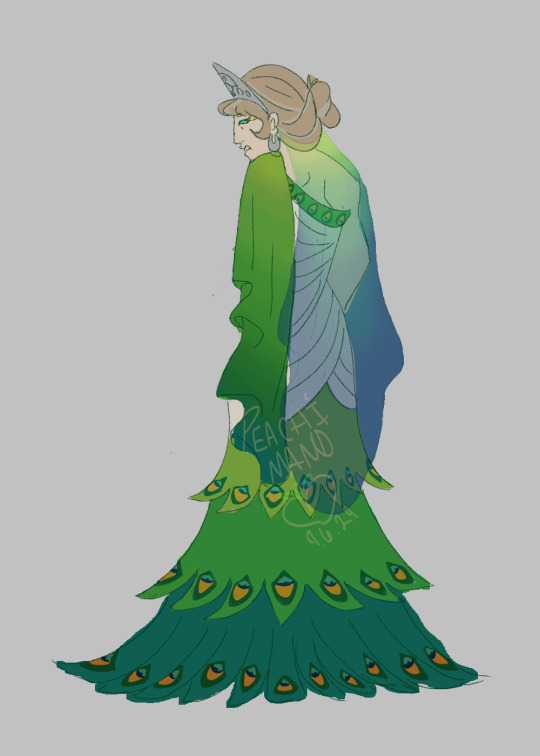

Here's Hera and Hermes! I'm rlly proud of Heras dress design 🧡
#my artwork#art#digital art#i drew this#epic the wisdom saga#epic: the musical#greek gods#greek mythology#epic the musical#greek mythology art#hera#hermes#queen of the gods#wouldnt you like#god games
64 notes
·
View notes
Photo

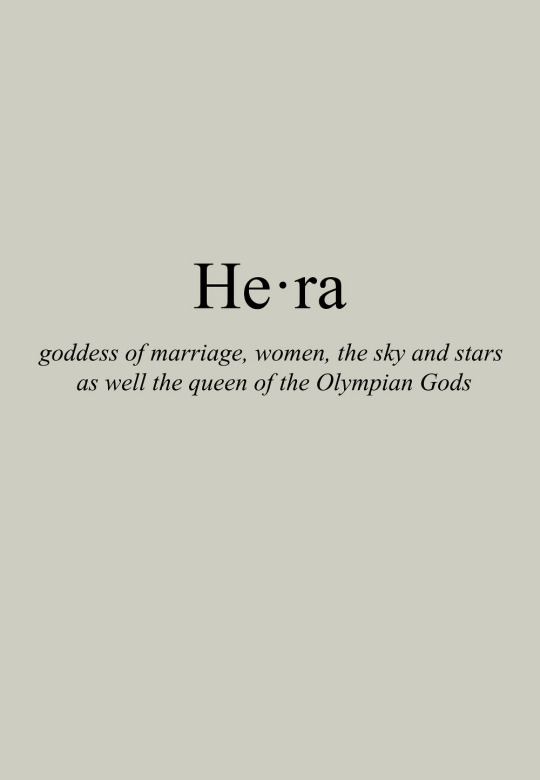

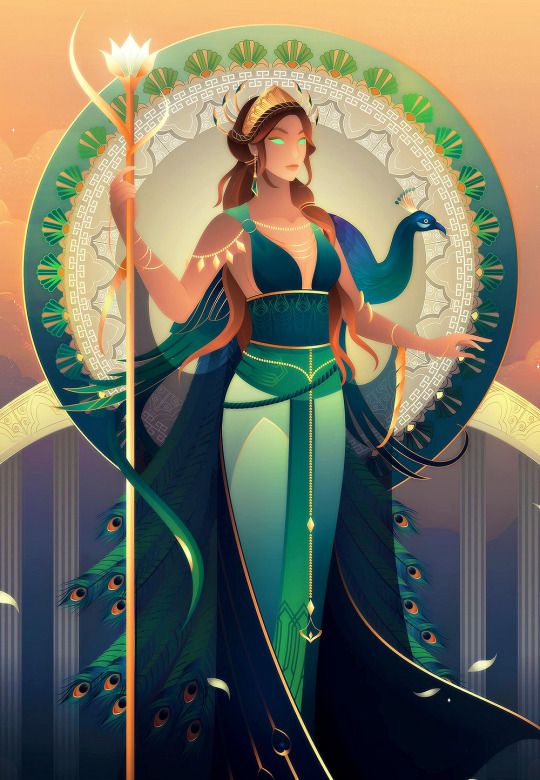
The Evermore Grimoire: Greek Mythology
Hera (Ἥρα meaning ‘Juno’) was the goddess of marriage, women, the sky and stars, as well as the queen of the Olympian Gods in Greek mythology. She was bold, clever, and powerful, yet it was for her less flattering characteristics that she was best known for. Above all else, Hera was a jealous and vengeful goddess who struggled with her husband Zeus (king of the gods) and his many infidelities both mortal and divine that often left her in a rage. In the end, her constant anger and consistent inability to exact the revenge she sought spoke powerfully to the place and perception of women in ancient Greece. The cow and the peacock were also known to be sacred to Hera. According to one myth, Zeus once fell in love with Io, a priestess of Hera. In a fit of jealousy, Hera demanded that her husband bring her the young girl, and when he brought her, Hera immediately transformed Io into a cow. She then gave her to her servant Argos, an all-seeing monster who had a hundred eyes all over his body. Argos' job would be to guard Io. Zeus though, took pity on Io and wanted to help her. He summoned Hermes (god of trade) and ordered him to kill Argos. Hermes approached the monster and began to play the flute in order to hypnotise it. Soon the monster fell into a deep sleep and Hermes took a stone and destroyed it. However, Hera knew of the plan and had already removed the eyes from Argos beforehand. Thus, after Argos' death, Hera transferred all of his eyes to the tail of a peacock to thank and honour her faithful servant.
artwork by Yliade
#MythEdit#MythologyEdit#FYeahMyths#FantasyEdit#Greek Mythology#Queen of the Gods#Hera#Goddesses#My Edit
719 notes
·
View notes
Text

"SO MANY HEROES, SO MANY TALES!"
#epic the musical#epic musical#epic fanart#epic the musical fanart#epic the musical hera#hera#hera epic the musical#goddess of marriage#greek goddess#queen of the gods#epic the wisdom saga#fanart#digital art#art#digital artwork#my artwork#my art#procreate#procreate art
46 notes
·
View notes
Text








chb cabin aesthetics: 11/?
👑👰🏻♀️ Hera - Cabin 2 💍🦚
Whenever I’m alone with you / You make me feel like I am home again / Whenever I’m alone with you / You make me feel like I am whole again / However far away / I will always love you / However long I stay / I will always love you / Whatever words I say / I will always love you / I will always love you
“Lovesong” - The Cure
(feel free to send me moodboard requests!)
#hera#hera goddess#hera greek mythology#hera aesthetic#cabin two#cabin 2#camp half blood#chb cabin aesthetic#percy jackson#percy jackson and the olympians#percy jackson & the olympians#pjo#pjo series#pjo hoo toa#percy jackson aesthetic#rick riordan#riordanverse#greek mythology#mythology aesthetic#marriage#motherhood#family#loyalty#queen#queen aesthetic#white and gold#light academia#light acadamia aesthetic#the cure#my moodboards
67 notes
·
View notes
Text
Holy Trinity of three mums
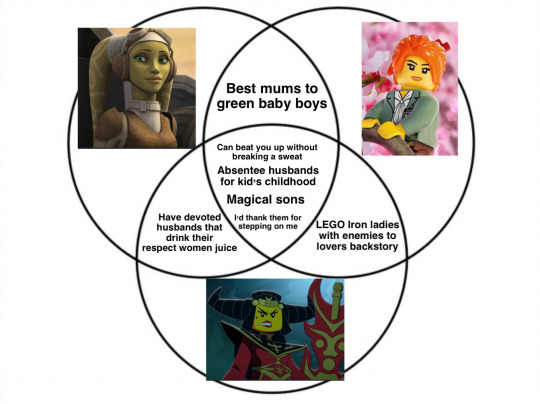
#ninjago#star wars#lego ninjago#monkie kid#lego monkie kid#star wars rebels#hera syndulla#princess iron fan#lmk princess iron fan#koko garmadon#ninjago koko#sw rebels#lmk#the lego ninjago movie#tlnm#I apparently really like Venn diagrams#There are fics involved so keep your eyes peeled#they are queens#look I get Iron Fan might not be the best mum but let me have my fanon depiction#she fought her husband to protect Red Son#if you know all three and get this you are awesome
83 notes
·
View notes
Text

#my mom#hera syndulla#make my brain go brrrrrrrr#doodle#star wars#rebels#Star Wars rebels#swr#artists on tumblr#star wars fanart#tbb#starwarsblr#art#illustration#keelidraws#she looks a little wonked but that’s ok#we can stan womkey queens
191 notes
·
View notes
Text
there's just something about the art style of the war of the rohirrim that's putting me off but i can't really say what it is
#it's probably some of the character design#particularly hera's#it kind of doesn't fit in with the rest??#also my friend said that some of the characters have “one piece faces” and now i can't unsee it#it was stupid of me but i expected the character design to be more similar to vinland saga or the 2 queens#lotr#lord of the rings#tolkien
18 notes
·
View notes
Text
In my Zeus bag today so I'm just gonna put it out there that exactly none of the great Ancient Greek warrior-heroes stayed loyal and faithful and completely monogamous and yet none of them have their greatness questioned nor do we question why they had the cultural prominence that they did and still do.
Jason, the brilliant leader of the Argo, got cold feet when it came to Medea - already put off by some of her magic and then exiled from his birthland because of her political ploys, he took Creusa to bed and fully intended on marrying her despite not properly dissolving things with Medea.
Theseus was a fierce warrior and an incredibly talented king but he had a horrible temper and was almost fatally weak to women. This is the man who got imprisoned in the Underworld for trying to get a friend laid, the man who started the whole Attic War because he couldn't keep his legs closed.
And we cannot at all forget Heracles for whom a not inconsiderable amount of his joy in life was loving people then losing the people around him that he loved. Wives, children, serving boys, mentors, Heracles had a list of lovers - male and female - long enough to rival some gods and even after completing his labours and coming down to the end of his life, he did not have one wife but three.
And y'know what, just because he's a cultural darling, I'll put Achilles up here too because that man was a Theseus type where he was fantastic at the thing he was born to do (that is, fight whereas Theseus' was to rule) but that was not enough to eclipse his horrid temper and his weakness to young pretty things. This is the man that killed two of Apollo's sons because they wouldn't let him hit - Tenes because he refused to let Achilles have his sister and Troilus who refused Achilles so vehemently that he ran into Apollo's temple to avoid him and still couldn't escape.
All four of these men are still celebrated as great heroes and men. All four of these men are given the dignity of nuance, of having their flaws treated as just that, flaws which enrich their character and can be used to discuss the wider cultural point of what truly makes a hero heroic. All four of these men still have their legacies respected.
Why can that same mindset not be applied to Zeus? Zeus, who was a warrior-king raised in seclusion apart from his family. Zeus who must have learned to embrace the violence of thunder for every time he cried as a babe, the Corybantes would bang their shields to hide the sound. Zeus learned to be great because being good would not see the universe's affairs in its order.
The wonderful thing about sympathy is that we never run out of it. There's no rule stopping us from being sympathetic to multiple plights at once, there's no law that necessitate things always exist on the good-evil binary. Yes, Zeus sentenced Prometheus to sufferation in Tartarus for what (to us) seems like a cruel reason. Prometheus only wanted to help humans! But when you think about Prometheus' actions from a king's perspective, the narrative is completely different: Prometheus stole divine knowledge and gifted it to humans after Zeus explicitly told him not to. And this was after Prometheus cheated all the gods out of a huge portion of wealth by having humans keep the best part of a sacrifice's meat while the gods must delight themselves with bones, fat and skin. Yes, Zeus gave Persephone away to Hades without consulting Demeter but what king consults a woman who is not his wife about the arrangement of his daughter's marriage to another king? Yes, Zeus breaks the marriage vows he set with Hera despite his love of her but what is the Master of Fate if not its staunchest slave?
The nuance is there. Even in his most bizarre actions, the nuance and logic and reason is there. The Ancient Greeks weren't a daft people, they worshipped Zeus as their primary god for a reason and they did not associate him with half the vices modern audiences take issue with. Zeus was a father, a visitor, a protector, a fair judge of character, a guide for the lost, the arbiter of revenge for those that had been wronged, a pillar of strength for those who needed it and a shield to protect those who made their home among the biting snakes. His children were reflections of him, extensions of his will who acted both as his mercy and as his retribution, his brothers and sisters deferred to him because he was wise as well as powerful. Zeus didn't become king by accident and it is a damn shame he does not get more respect.
#ginger rambles#ginger chats about greek myths#greek mythology#It's Zeus Apologist day actually#For the record Jason is my personal favourite of these guys#The argonauts are extremely underrated for literally no reason#And Jason's wit and sheer ability to adapt along with his piousness are traits that are so far away from what usually gets highlighted#with the typical Greek warrior-hero that I've just never stopped being captivated by him#Conversely I still do not understand what people see in Achilles#I respect him and his legacy I respect the importance of his tale and his cultural importance I promise I do#However I personally can't stand the guy LMAO#How do you get warned twice TWICE both by your mother and by Athena herself that going after Apollo's children is a bad idea#And still have the audacity to be mad and surprised when Apollo is gunning for Specifically You during the war you're bringing to His City#That You Specifically and Exclusively had a choice in avoiding#ACHILLES COULD'VE JUST SAID NO#I know that's not the point however so many other members of the Greek camp were simply casualties of Fate in every conceivable way man#Achilles looked at every terrible choice he could possibly make said “Well I'm gonna die anyway 🤷🏽” and proceeded to make the choice#so hard that he angered god#That's y'all's man right there#I left out Perseus because truthfully I don't actually know much about him#I haven't studied him even a fraction as much as I've studied some of the other big culture heroes and none of this is cited so i don't wan#to talk about stuff I don't know 100%#Anyway justice for Zeus fr#Gimme something give me literally anything other than the nonsense we usually get for him#This goes for Hera too btw#Both the king and queen of the skies are done TERRIBLY by wider greek myth audiences and it's genuinely disheartening to see#If y'all could make excuses for Achilles to forgive his flaws y'all can do it for them#They have a lot more to sympathise with I'll tell you that#(that is a completely biased statement; you are completely free and encouraged to enjoy whichever figures spark joy)#zeus
177 notes
·
View notes
Text
Hera's Indecent Proposal to Ares 👀
**After the big blowout from Hebe's celebration, Queen Hera and Prince Ares decompress in her Quarters on Olympus.**
Ares: Remember when I was a child and said I did not want a little sister?
Hera: (soft giggle) Yes, I do.
Ares: After Hephaestus fell from Olympus and you were again with child, I vowed to the River Styx that whatever you birthed, I would love and protect him…or her. Always.
Hera: (warm smile) And I gave birth to Hebe. Who you love and protect. Always.
Ares: I would do anything for her.
Hera: (raise brow) Anything?
Ares: Yes, anything. I would die for her.
Hera: That is well and good, but would you marry her?
Ares: What? (jumps from seat) No, I would not!
Hera: Why? How is marriage worse than death? I am not asking for your life.
Ares: Oh, but you are, mother. Besides, Hebe is my sister!
Hera: (rolls eyes) The gods marry siblings all the time. (gets up and fixes him a warm drink) Zeus is my brother. Your grandparents are siblings. Why, your great-great-grandmother and your great-grandfather are mother and son.
Ares: (takes the drink and chuckles) Then shall I marry you?
Hera: In a perfect world. (kisses his cheek, then turns stern) But I am already married. Your sister...is not!
Passions of the Gods by Leah Nightingale exclusively on Amazon or read free in Kindle Unlimited.
#passions of the gods#greek myth retellings#greek mythology#my writing#ares#queen hera#hera#hera goddess#goddess hebe#zeus#greek goddesses#greek gods#hera x zeus#hera and ares#fantasy novel#greek mythology quotes#incorrect greek quotes#hera greek mythology#kindle unlimited#kindle ebooks#ares god of war
31 notes
·
View notes
Text
why does no one talk about how w359 has the most likable female characters podcast characters.
#wolf 359#not throwing names but many female characters push the line of ‘justified female anger’ and just end up being unlikable#it’s a tough line to walk but !! w359 does it well#anyways this is about minkowski and lovelace i love them#DONT GET ME STARTED ON HERA#even maxwell like ?#my queens
84 notes
·
View notes
Note
New Crossover idea :
Hera from GODs'School ⚡the OlympianGods® and Lampwick from Pinocchio 1940 having a mentor and Her Apprentice type of relationship!


Your thoughts ?
I was at first unfamiliar with her character and the show, but after doing some research, I fully support this!
Hera from “Gods’ School: The Olympian Gods” and Lampwick from Disney’s 1940 “Pinocchio” having a mentor-apprentice relationship is quite intriguing!
Hera as a Mentor
Guidance with Authority: Hera, the self-declared most popular student and queen bee, could guide Lampwick with a firm hand. Her authoritative presence would command respect and ensure Lampwick takes her lessons seriously.
Balancing Emotions: Despite her envy and jealousy, Hera’s genuine care for those she loves could help her connect with Lampwick on a deeper level, teaching him the importance of loyalty and responsibility.
Influence and Power: As the head of cheerleaders and the welcoming committee, Hera’s influence could open doors for Lampwick, helping him navigate social dynamics and understand the power of alliances.
Lampwick as an Apprentice
Room for Growth: Lampwick, with his rebellious nature, has much to learn. Under Hera’s mentorship, he could channel his energy into positive actions and develop a sense of purpose.
Learning from Mistakes: Hera could help Lampwick understand and learn from his past mistakes, such as his behavior on Pleasure Island, fostering personal growth and resilience.
Building Character: Through Hera’s guidance, Lampwick could develop virtues like patience, respect, and perseverance, becoming a better version of himself.
Mutual Benefits
Empathy and Understanding: Mentoring Lampwick could help Hera develop empathy and understanding, softening her often stern demeanor.
Fresh Perspective: Lampwick could offer Hera a fresh perspective on life, helping her see things from a different angle and perhaps even rekindling a sense of youthful curiosity and adventure.
Balanced Relationship: The dynamic between Hera’s authority and Lampwick’s rebelliousness create a balanced relationship where both learn from each other, leading to mutual growth and development.
This mentor-apprentice relationship, with Hera’s queen bee personality, is a fascinating blend of mythology and classic storytelling, showing how guidance and learning can change people.
That or Lampwick could be the Cady Heron to Hera's Regina George, and they can be Mean Girls together because it'll be fetch!
#my asks#ask#asks#echo answers stuff#gods school#pinocchio 1940#pinocchio disney#disney pinocchio#lampwick#hera#hera goddess#gods school hera#hera gods school#hera greek mythology#lampwick pinocchio#pinocchio#pinocchio lampwick#disney lampwick#lampwick disney#crossover#crossover ship#crossover friendship#crossover idea#platonic ship#mentorship#mentor and apprentice#crossover shipping#mean girls#queen bee
8 notes
·
View notes